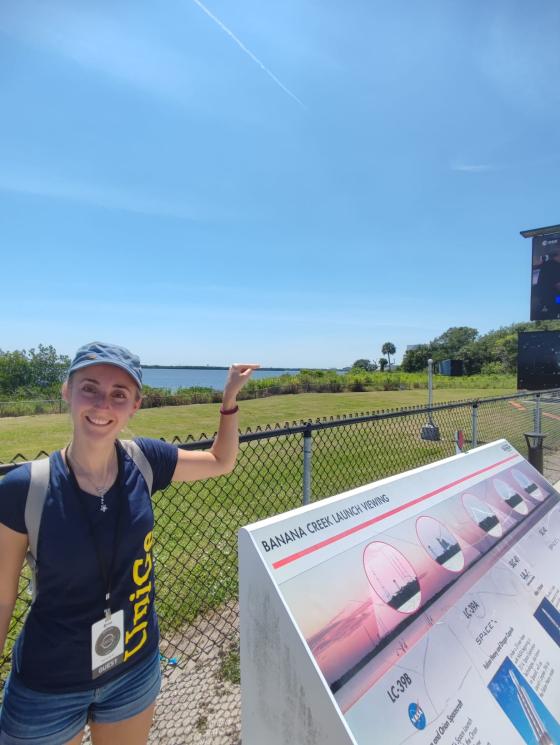At 17:12 on Saturday, July 1, 2023, the new Euclid space telescope began its journey from the Kennedy Space Center in Florida.
Present at the launch was also Ilaria Risso, a Physics Ph.D. student and member of the Euclid Consortium, which includes students, professors, and researchers from the Department of Physics - DIFI of the University of Genoa, as well as researchers from the National Institute for Nuclear Physics – INFN, Genoa Section and the National Institute for Astrophysics – INAF, associated headquarters in Genoa.

Ilaria Risso is conducting her Ph.D. research in Physics as part of the Euclid experiment, under the supervision of Enzo Branchini, a professor of Astronomy and Astrophysics at the University of Genoa, Silvano Tosi, a professor of Experimental Physics at the University of Genoa, and Stefano Davini from INFN, Genoa Section.
Euclid is a mission of the European Space Agency (ESA) that aims to understand the properties of dark matter and dark energy, the two dominant constituents of our Universe, about which very little is known. Along with France and the United Kingdom, Italy plays a leading role in the Euclid mission. Thanks to the support of the Italian Space Agency (ASI), Italy has assumed important responsibilities in the experiment.
The Euclid group from Genoa has been extensively involved in the preparatory phases of the satellite mission, and its members currently hold critical roles in various processes, including raw data quality control and the estimation of crucial physical quantities that define our Universe.
Tasks for the Euclid mission
To achieve its primary scientific objectives, over a span of 6.5 years, Euclid will map the spatial distribution, resembling a "cosmic spider web," of matter in the Universe, whose properties are influenced by the expansion of the Universe itself and the nature of dark matter.
Euclid employs various techniques, with the "clustering of galaxies" being a key method. By accurately mapping the spatial positions of around 30 million galaxies, Euclid will provide valuable information about the distribution of visible and dark matter, as well as studying the effects of dark energy on the evolution of cosmic structures.
Additionally, Euclid utilizes the "weak gravitational lensing effect" by measuring the distortions in the shapes of distant galaxies caused by the gravitational deflection of light.
By combining galaxy clusters, weak gravitational lensing, and other "cosmological probes" such as galaxy clusters, cosmic voids, and the cosmic microwave background, Euclid will thoroughly explore the nature of dark matter and dark energy. Moreover, it will enable precise tests of the validity of General Relativity on previously unexplored scales.
"The development of new lines of research in astrophysics and cosmology and the expansion of educational offerings in these fields have been among the objectives pursued by the Department of Physics - DIFI of the University of Genoa within the framework of the 'Dipartimenti di Eccellenza 2018-2022' project by the MUR. It is a great satisfaction for everyone to see adventures like participating in the Euclid mission come to fruition," said Silvano Tosi. "UniGe has truly talented students who, with great passion and enthusiasm, approach the study of disciplines at the forefront of scientific and technological research. It is a privilege for UniGe professors to work alongside them and help them find their way to become the scientists of the future."



